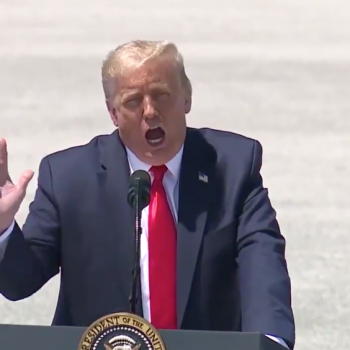At the height of the coronavirus pandemic, it was a story we saw over and over: Christian pastors like the notorious Tony Spell defiantly announcing their intention to continue gathering in large numbers, sans masks, claiming precautions against spreading disease infringed on their religious liberty.
So it’s a fair question to ask: Does Christian belief lead people to disregard COVID-19 precautions like social distancing, mask wearing, and vaccination (once it becomes available)?
A new study from the Journal for the Scientific Study of Religion says it’s not mere Christianity that causes this kind of anti-science response. In fact, the study found that religiosity was strongly linked to precautionary behaviors.
But a specific subset of Christians — Christian Nationalists — showed a clear pattern of defiant responses to scientific recommendations.

Study authors Samuel L. Perry and Andrew L. Whitehead wrote the book on Christian Nationalism, literally: Just before the pandemic reached critical mass, they released Taking America Back for God: Christian Nationalism in the United States. They define Christian Nationalism as a commitment to a particular social hierarchy informed by the idea of America as a Christian nation:
At its heart, Christian nationalism demands that we must preserve a particular kind of social order, an order in which everyone — Christians and non-Christians, native-born and immigrants, whites and minorities, men and women — recognizes their “proper” place in society.
Beliefs associated with Christian nationalism include an understanding of America as “chosen” or protected by a culturally conservative God, a rejection of science and scientific thought, skepticism towards mainstream news sources, and political support for the Trump presidency.
Perry and Whitehead teamed up with psychology researcher Joshua B. Grubbs to conduct the study, using data from the Public and Discourse Ethics Survey to determine whether respondents took precautions against spreading COVID-19 or engaged in “incautious behaviors” like breaking quarantine, attending large gatherings, eating in restaurants, or working outside the home. They compared these to pre-COVID levels of Christian nationalism, measured by participants’ agreement or disagreement with statements about church-state separation and America’s Christian character.
Here’s what they found:
Analyzing panel data collected in the thick of the COVID-19 crisis, we find Christian nationalism was the leading predictor that Americans engaged in incautious behavior like eating in restaurants, visiting family/friends, or gathering with 10+ persons (though not attending church), and was the second strongest predictor that Americans took fewer precautions like wearing a mask or sanitizing/washing one’s hands.
In other words, polls that have connected level of religious belief to lack of COVID precautions have been “getting it wrong,” says Perry. It’s not the religion that makes the difference, but the specific toxic blend of religion and political ideology that colors adherents’ interpretation of facts.
It’s worth noting that the study hasn’t been peer-reviewed; the journal’s editor granted it an expedited review because of its timely subject matter. And of course, correlation doesn’t equal causation.
But the anti-science, anti-media element of Christian Nationalism makes a powerful argument for a causal link, as does the observation that Donald Trump‘s dismissal of masking and other precautions may have driven skepticism among his followers, who view him as a more trustworthy source of information: “The guy who sticks up for the values of ‘Americans like us.'”
As if we needed any more evidence that hard-right Christian Nationalism is a scourge on America and the world.
(Image via Shutterstock. Thanks to Brian for the link)



It’s Moving Day for the Friendly ..."
It’s Moving Day for the Friendly ..."
It’s Moving Day for the Friendly ..."
It’s Moving Day for the Friendly ..."